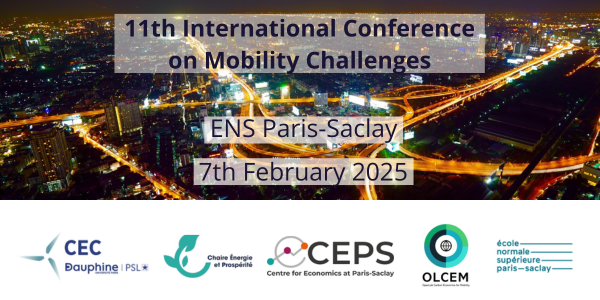On February 7, we hosted the 11th International Conference on Mobility Challenges, where we engaged with leading academics, stakeholders from the automotive industry, civil society, and public services on the challenges of inclusively decarbonizing transport, developing our European industry, and avoiding inefficiencies. This diverse mix consistently provided fertile ground for valuable insights, new connections, and fresh questions and ambitions.
We warmly thank all participants.
Here is the content of the program and access to some of the presentations.
Open Address – Maria Eugenia SANIN (Chaire Energie et Prospérité; CEPS, U. Paris-Saclay).
Decarbonizing long distance transport
Chair: Marc BAUDRY (Chaire Economie du Climat; U. Paris-Nanterre).
Accessibility of transport transition
Chair: Maria Eugenia SANIN (Chaire Energie et Prospérité; CEPS, U. Paris-Saclay).
Compensating emissions for the automotive industry
Chair: Clément DUMAND (Stellantis)
Roundtable: transportation at the crossroads of our decade´s challenges
Facilitator: Peter SIGAL (Automotive News Europe)
Climate Economics Chair: Anna CRETI (U. Paris-Dauphine) and Marc BAUDRY (U. Paris-Nanterre)
Energy and Prosperity Chair: Maria-Eugenia SANIN (Chaire Energie et Prospérité; CEPS, U. Paris-Saclay)
OpenLab Carbon Economics for Mobility: Yannick PEREZ (CentraleSupelec) and Emma JAGU (CentraleSupelec)
Local Organizing Committee: Maria-Eugenia Sanin (CEPS, U. Paris-Saclay); Natacha Raffin (CEPS, U. Paris-Saclay)

No Upcoming Events found!

